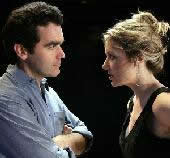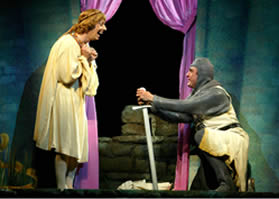HotReview.org Editor's
Picks
Shows Worth Seeing:

The Pavilion
By Craig Wright
Rattlestick Playwrights Theater
224 Waverly Pl.
Box office: (212) 868-4444
Craig Wright’s The Pavilion was written
in 2000 but has taken 5 years to reach New York, despite being
nominated for the Pulitzer Prize and receiving numerous regional
productions. The ubiquitous speculation about this delay has ranged
from the dismal post-9/11 Off-Broadway economics to a longstanding
urbane prejudice against anything that smacks of the old-fashioned
wholesomeness of Thornton Wilder. Wright’s sweet, thoughtful
work indeed owes a lot to Wilder, yet its originality, its prickly
contemporaneity, and its strong, blessedly unfashionable sincerity
are also beyond question. The nominal setting is a 20-year high-school
reunion in Minnesota, where Kari (Tasha Lawrence) sees Peter (Brian
D’Arcy James) for the first time since he ran off, leaving
her pregnant and heartbroken. Both have been through a lot in
the meantime, and are unhappy, and as the evening progresses they
move slowly through swamps of rage and regret to consider renewing
their relationship. It’s no ordinary evening and no ordinary
setting, though, as the entire action is presided over by a Narrator
(Stephen Bogardus) who editorializes and imposes himself even
more determinedly than his obvious forebear, the Stage Manager
in Our Town. This Narrator transforms a humble tale of
loss and regret into a remarkable meditation on time, waxing poetic
(and a little prolix, at times) about such recondite matters as
forgiveness and spiritual presence. The net of cosmic connections
he posits doesn’t quite hold together in the end, but there’s
more than enough lucid emotional truth in this work—and
in these excellent performances—to leave most open-minded
viewers happy they went.
-------------------------------

The Girl in the Flammable Skirt
Adapted by Bridgette Dunlap from the book by Aimee Bender
Walkerspace
46 Walker St.
Box office: (212) 868-4444
Aimee Bender’s stories are written in a bold
and crisp magical realism that surprises by consistently finding
fresh treasures in self-consciously bizarre waters that one would’ve
thought others had thoroughly fished out. The fable-like tales
in the 1999 collection The Girl in the Flammable Skirt
veer off into unpredictably weird and violent currents, tempered
by a subtly aggressive undertone that keeps them from ever turning
sappy even though they’re essentially about very conventional
matters such as teenage loneliness and suppressed passion. A young
woman comes home one day to find her lover stuck in a process
of “reverse evolution,” losing “a million years
a day”: first he’s an ape, then a sea turtle, eventually
a one-celled creature she releases into the sea. A mermaid uses
crutches and an imp uses stilts to try to fit in as normal high-school
students. A girl with a hand of ice and another with a hand of
fire become different sorts of misfits and healers in a creepily
isolated provincial town. The wisdom of adapting Bender’s
stories into drama isn’t obvious: an imagined “fire
hand,” for instance, is always going to be more astonishing
than any live effect with a glove. No doubt partly because of
the terrific female protagonists, however, the Ateh Theater Group—a
collective of seven women—has chosen this material for its
inaugural production, and the show is well worth seeing. Director
and adaptor Bridgette Dunlap has fine sense of pacing and tone
and a knack for knockabout comedy. Also, the young company ultimately
makes up in pep for what is lost in marvelousness, so that their
enthusiasm and cleverness come off in the end as a sort of surrogate
marvelousness that does Bender proud.
----------------------

Spamalot
By Eric Idle and John Du Prez
Shubert Theatre
225 W. 44th St.
Box office: (212)239-6200
The great surprise of this musical recycling of
the classic movie comedy Monty Python and the Holy Grail
is the amount of pleasure that can evidently be had at a Broadway
show almost completely devoid of surprises. The play is not so
much written as cobbled together from gags and vignettes so familiar
to the audience that laughs often occur before a joke is told.
The very appearance of certain beloved faux-medieval costumes,
props and set pieces is enough to create giggling spasms at some
points. There are scraps of novelty: the addition of silly songs
and Vegas razzle-dazzle, as well as the transformation of self-consciousness
about film into self-consciousness about theater (the toothsome
Sara Ramirez, as the Lady of the Lake, has some wonderfully gratuitous
numbers). The show is basically a masterful spectacle of repackaging,
though. And what’s interesting about that is that the audience
is laughing at the old gags for new reasons. People seem to savor
the experience of enjoying the jokes in the particular circumstance
of the theater, perhaps because that communal context recalls
the original post-screening group-guffaws that extended their
first enjoyment of the movie for months and years afterward. Quasi-private
ribbing is reinvented and validated as a public event. In any
case, the palpable thrill of rediscovery has a college-reunion
flavor that is undeniably infectious.
-------------------------------

Doubt
By John Patrick Shanley
Walter Kerr Theatre
219 W. 48th St.
Box office: (212) 239-6200
This splendidly acted, 90-minute clenched fist of a play may
be the most penetrating and tautly written work of Shanley’s
long career. It’s certainly the most urgent. Cherry Jones
plays a tight-lipped, straight-laced, rule-mongering nun who,
as principal of a Bronx Catholic school in 1964, suspects the
young parish priest of misbehaving with an 8th-grade boy. She
has no hard evidence but nevertheless feels certain and is determined
to bring the priest down. Father Flynn is clever, earnest, liberal
and likeable, though, and the actor Brian F. O’Byrne gives
him a fascinatingly ambiguous edge of intellectual ambitiousness.
By the time he finishes defending himself the audience doesn’t
know whom to believe. Jones’s severity as Sister Aloysius
is frightening and her authoritarian harangues about self-effacement
in teaching to Sister James (Heather Goldenhersh), the boy’s
teacher, make her hateful, but as she presses the question of
the kid’s immediate safety--in the context of a rigid, top-down
institutional structure that won't protect him--the plot starts
to work as a powerful parable of justice and pseudo-justice in
a time of supposed emergency. Director Doug Hughes has found just
the right pace for the action, keeping it tightly coiled until
about two-thirds through when open confrontation replaces speculation
and insinuation. It’s thrilling to watch these formidable
actors run with the ball after that point, particularly when you
can really see their faces. Anyone who can afford it should spring
for the front seats in the big Broadway theater where the show
has now moved; the nature of the stalemate between this nun and
priest can't be fully appreciated without seeing the subtlety
of O'Byrne's reactions during the penultimate scene.
------------------------
